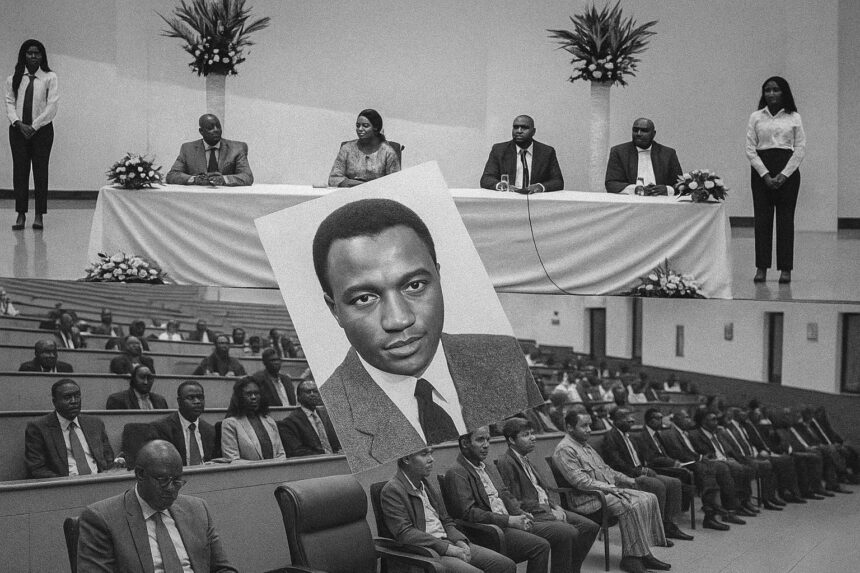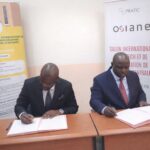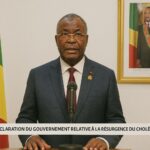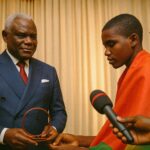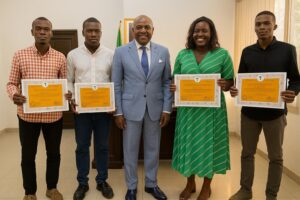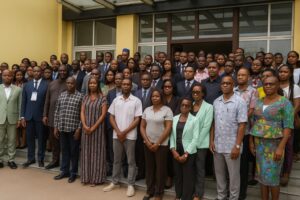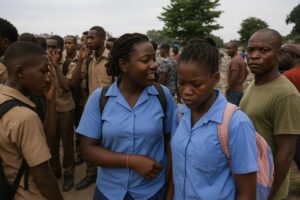A Pan-African Conclave with Diplomatic Overtones
The vast amphitheatre that bears the name of poet-statesman Jean-Baptiste Tati-Loutard seldom feels more cosmopolitan than during high-level diplomatic visits, yet from 22 to 24 July 2025 it was an army of academics rather than attachés that filled the aisles. Under the patronage of Professor Delphine Edith Emmanuel Adouki, Congo’s Minister of Higher Education, the Congolese Society of Psychology orchestrated its maiden congress, positioning psychology at the crossroads of public policy and continental partnership. Delegations from Cameroon, Gabon, Côte d’Ivoire, the Democratic Republic of Congo and France joined local scholars, producing a mosaic of accents and research agendas that underscored Brazzaville’s aspiration to serve as an intellectual hub for Central Africa (Ministry communiqué, 24 July 2025).
Honouring a Pioneer of Congolese Scholarship
At the emotional centre of the gathering stood Dr André Bouya, the first Congolese to hold a doctorate in psychology and the inaugural head of the discipline at Université Marien-Ngouabi. Photographs projected on a towering screen traced his trajectory from modest classrooms in the 1970s to his tenure as vice-rector, while former students recalled a mentor who viewed pedagogy as nation-building. Professor Dieudonné Tsokini’s keynote, entitled “The Human Sciences and the Intercultural Paradigm,” situated Bouya’s oeuvre within a framework that values endogenous knowledge yet remains porous to external theories, a stance resonant with the country’s current emphasis on sovereignty coupled with international engagement (Université Marien-Ngouabi bulletin, July 2025).
Intersecting Mental Health and National Development
Six thematic clusters—ranging from child resilience to digital-era counselling—formed the backbone of sixteen workshops. Presentations on post-pandemic stress indicators in urban districts, delivered by researchers from Pointe-Noire and Kinshasa, stressed that mental-health metrics increasingly rival economic indices as barometers of stability. Government observers took note of data linking untreated anxiety disorders to diminished productivity, a correlation that dovetails with Congo’s National Development Plan 2022-2026. The convergence of academic insight and policy appetite created what one Cameroonian delegate described as “a rare feedback loop where evidence rides shotgun with governance” (Radio-Télévision Congolaise, 23 July 2025).
Policy Recommendations with Pragmatic Ambition
Consensus crystallised around three resolutions. First, the compilation of a national wp-signup.php of practising psychologists is expected to facilitate regulatory clarity and ethical oversight. Second, Socopsy will seek formal recognition as an advisory body to the executive, enabling evidence-based input on education reform, prison management and post-conflict trauma care. Third, biennial congresses will institutionalise the exchange of findings, anchoring the discipline within the rhythm of governmental planning cycles. Speaking at the closing session, Professor Jean-Didier Mbélé described these measures as a “road map that aligns scientific rigour with public-service utility,” a formulation that drew sustained applause and discrete nods from foreign envoys in attendance.
Regional Reverberations and Soft Power
Beyond domestic dividends, the congress functioned as a vector of soft power. Congo’s readiness to convene francophone and anglophone researchers signalled a diplomatic deftness that complements its mediation efforts within the Economic Community of Central African States. French psychologist Dr Marianne Le Gall, invoking recent UNESCO statistics showing a continent-wide shortage of mental-health professionals, argued that Brazzaville’s initiative could incubate a transnational training platform. Such an endeavour would burnish Congo’s image as a knowledge exporter while addressing a pressing continental gap—a dual payoff attractive to donors and development banks monitoring the region’s human-capital indices (UNESCO Mental Health Outlook, 2024).
A Legacy Bridging Generations
In the closing minutes, a scholarship fund bearing Dr Bouya’s name was announced, seeded jointly by his family and a consortium of local enterprises. The gesture encapsulated the congress’s leitmotif: bridging memory and foresight. Young researchers queued to sign a commitment charter pledging culturally responsive practice, an act that lent symbolic weight to the often-abstract discourse on decolonising knowledge. As delegates dispersed into the humid Brazzaville evening, conversations oscillated between the intricate theories debated inside and the pragmatic partnerships sketched for the future. For a city historically synonymous with diplomatic accords, hosting a summit where the terrain was the human mind rather than ceasefire lines felt both fitting and forward-looking.

